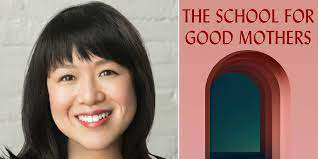Even though some of the reviews had prepared me for the futuristic turn in Jessamine Chan's novel The School for Good Mothers. The author does not delay throwing the reader into the story on 39-year-old Frida Liu's "bad day," in which she leaves her fussy toddler daughter Harriet home alone to run for coffee, turning into a two-hour diversion. When the neighbors hear the girl crying and call the authority, the child is taken into protective custody and turned over to her father, Harriet's ex-husband and Susanna, the young Pilates instructor for whom he left Frida. Working with the same lawyer who represented her in the divorce, Frida meets challenges arranging chaperoned visits with her daughter with the social worker. She has to endure cameras placed throughout her apartment, part of a new program being test-piloted in the Philadelphia area.
Even with the Big Brother atmosphere established before the court date, readers will still be shocked when Frida not only doesn't regain custody but is sent to a training camp for "bad mothers" on a former college campus. The women there are forced to chant, "I am a bad mother, but I am learning to be good." The manipulation by the pink-uniformed attendants is unnerving, but when the women are issued robotic children simulating their own children for their re-education, the story takes a heart-wrenching turn for the creepy.
Frida's interaction with the other women takes on the feel of women's prison, and her growing tenderness toward the "doll" child she calls Emmanuelle is testament to her yearning to be reunited with her own daughter. The difference in age and ethnicity plays a role in the dynamics. As the only Asian mother in the school, Frida is often odd woman out.
In light of the current less-than-ideal system caring for child welfare, Chan's novel shows what can go wrong when the pendulum swings too far in the other direction and experimentation ignores human realities.







No comments:
Post a Comment